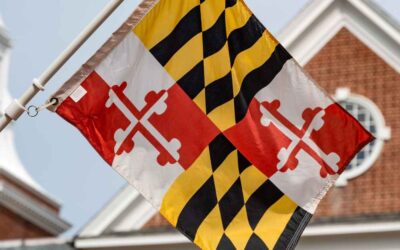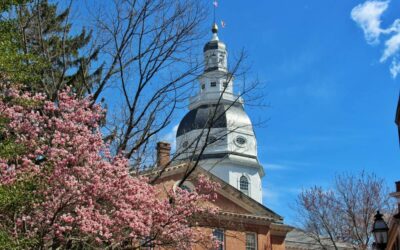
Maryland General Assembly – Final Session Report 2024
Despite rumors that differences on how to balance Maryland’s $63 billion budget would cause an extension to the 2024 Session, the legislature officially ended on time, Monday, April 8 at midnight. The following are some of the bills that will be sent to Governor Moore for his signature in the coming weeks:
Budget
The legislature haggled over the need to increase taxes to raise the revenue needed to start filling the budget deficits that are projected to exceed a billion dollars by fiscal year 2027. While the House wanted to start now by raising revenue sources, the Senate argued that there was still time to take a more measured approach to the issue. In the end, a compromise was reached that funded Maryland’s $63 billion budget and took small steps toward raising the extra revenue needed to fund transportation projects, shock trauma, and the Blueprint for Maryland’s Education program in future years. The increased revenue will be derived from a hike in cigarette and nicotine taxes, an annual surcharge for drivers of electric vehicles, and increased vehicle registration fees based on tiered weight classes.
Affordable Housing
One of Governor Moore’s key priorities this session was to find a way incentivize developers to build affordable housing units to fill the 97,000-unit shortfall that currently exists in Maryland. Although highly amended during the legislative session, a bill passed that would make multiple zoning changes to allow for development in higher density areas and prevent local governments from setting ‘unreasonable’ limits or requirements for development. The Senate tacked on a controversial amendment in the waning days of session that would allow for developers to more easily bypass local permitting regulations on land owned by the Federal government that was formerly a military installation.
Francis Scott Key Bridge
Following the devastating collapse of the Key Bridge two weeks before the end of the legislative session, the Maryland General Assembly scrambled to create emergency legislation that authorizes Governor Moore to use up to $275 million from the state’s Rainy Day Fund to offset wage losses by employees of the port, independent contractors, and port dependent businesses during the disruption at the Port of Baltimore. There was an amendment added by the House, intended to be a safeguard for these funds, that allows the funds to be withdrawn in increments of $25 million after notifying a legislative policy committee seven days prior to the withdrawal. This legislation goes into effect as soon as the Governor is able to sign it.
Juvenile Justice Reform
In response to constituent complaints about the increase in juvenile crime such as carjackings and firearm charges, the legislature passed a bill that expands the consequences for young offenders and adds new tracking requirements. The bill includes repercussions for children aged 10 to 12 years old who are caught carrying guns and stealing cars. The legislation gives the courts the ability to prolong probation, decides when state’s attorneys can review cases’ and sets up comprehensive juvenile legal system oversight and data collection.
Pimlico Race Track
A late-filed bill that was quickly ushered through the legislative process cleared the way for a state takeover of Pimlico Race Course and Preakness. The bill includes $400 million in bonds that will be used to demolish and rebuild the racetrack from the ground up. Preakness will be run by a nonprofit arm of state government in the future. The Senate added an amendment that would cap liability for the operating costs because of concerns by some lawmakers that taxpayers would be on the hook for future operating costs in the case of losses.
Gun Accountability
The Gun Industry Accountability Act will give the Attorney General and 24 local state’s attorney offices the ability to seek injunctive relief, restitution, compensatory and punitive damages, reasonable attorney’s fees and any other appropriate relief from firearm manufacturers and gun dealers for their role in contributing to gun violence. It also bans machine gun conversion devices, sometimes called Glock switches. The bill sponsor, Delegate Scott Phillips, said that this bill is about holding bad actors accountable.
Consumer Protections for Electricity
The legislature passed SB 1 that lays out protections for consumers and requires people who sell retail electricity contracts in Maryland to get state-issued licenses. Since the deregulation of the electricity industry in 1999, some energy retailers have taken advantage of the looser regulations to prey on poor and elderly consumers and sell power contracts that may start out as inexpensive but eventually balloon in price. SB 1 altered the requirements for the marketing and sale of electricity and gas by retail suppliers, utilities, and related entities and adds billing transparency in the residential market. This bill was highly contested during session but is expected to be signed by the Governor when it reaches his desk.
What impact will bills signed into law have on companies doing business in Maryland? Contact us to understand how our lobbyists can protect your interests and represent your voice.




